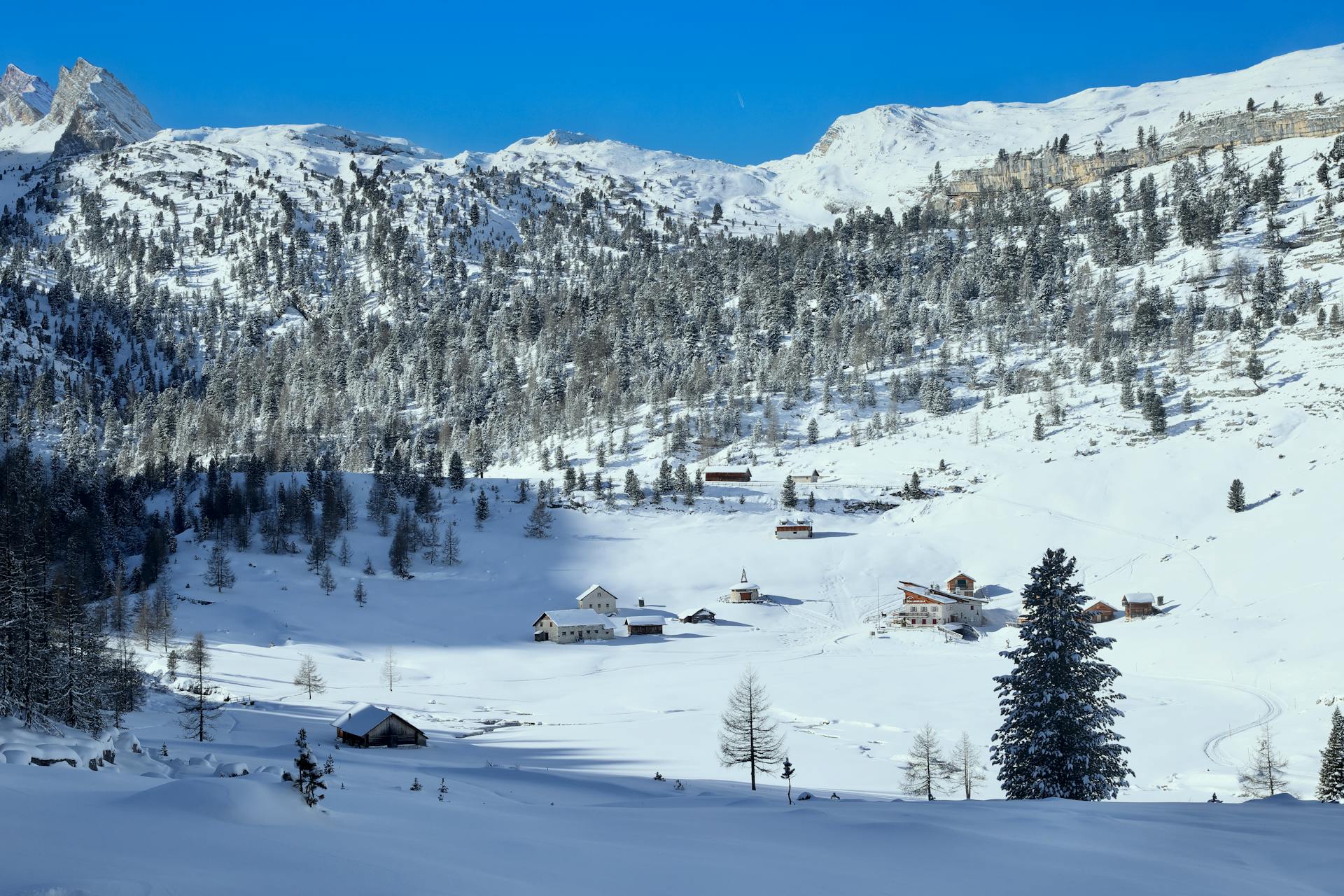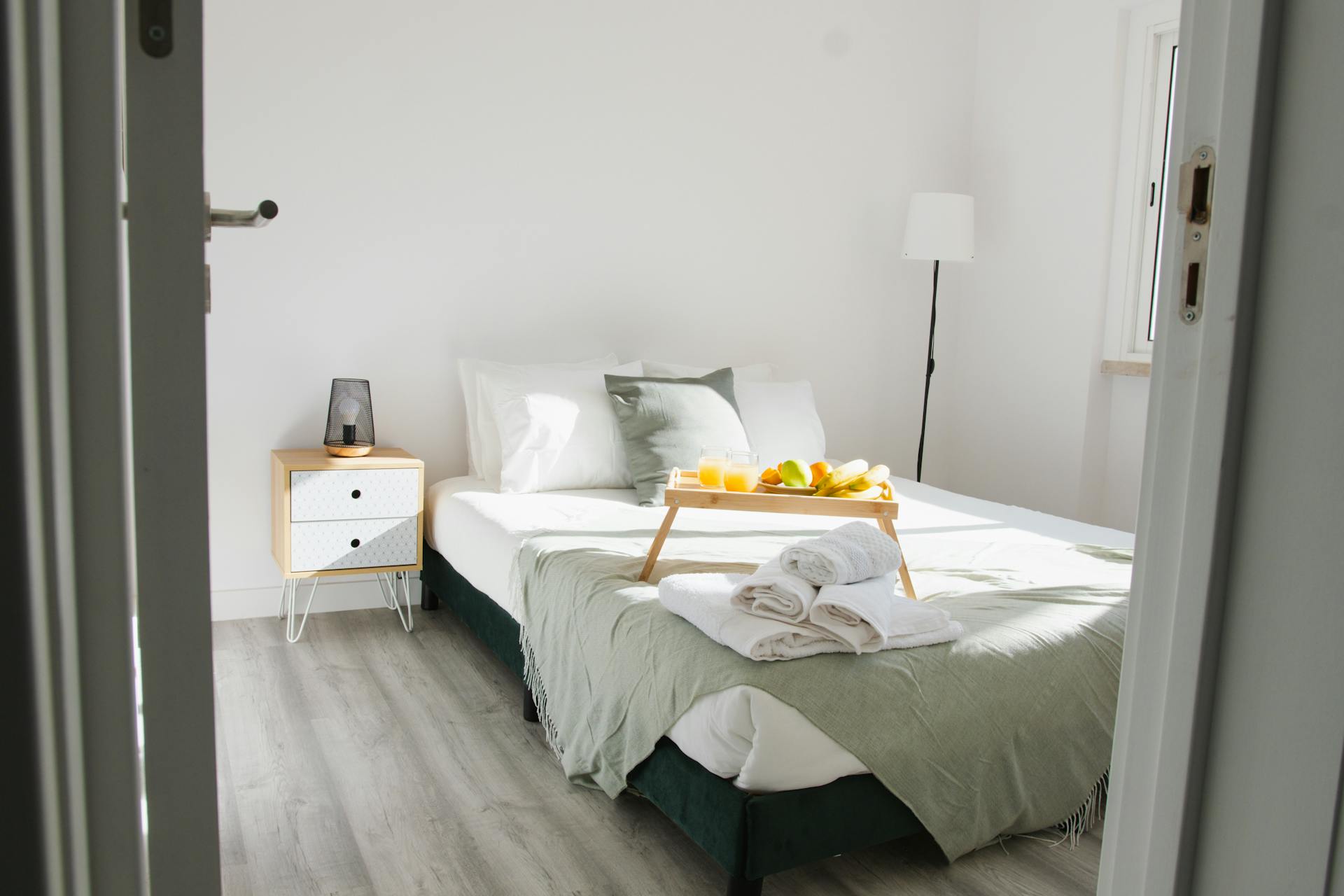
Italy's tourism industry is booming, and with it, the introduction of a tourist tax. This tax affects not just hotels, but also short-term rentals like Airbnb, making it essential for hosts and guests to understand the rules.
The tourist tax in Italy is also known as the "Tassa di Soggiorno" or "Tourist Tax". It's a municipal tax that varies from city to city, with some areas charging a flat fee and others a percentage-based rate.
In 2019, the Italian government introduced a decree that requires short-term rental platforms like Airbnb to collect and remit the tourist tax on behalf of hosts. This means that hosts will no longer be responsible for collecting the tax from guests.
As of 2022, the tourist tax in Italy ranges from €0.50 to €7 per person per night, depending on the location.
For another approach, see: City Tax Florence Italy
Understanding the Tax
In Italy, hosts are responsible for collecting and remitting tourist taxes, which can vary widely across municipalities. Compliance is key to avoid any last-minute surprises for your guests.
The tax year in Italy is from January 1 to December 31, and taxes are paid in installments. Hosts must submit their tax return online, directly or with a tax advisor's help, or using paper forms.
Income tax rates in Italy are progressive, with rates varying based on income. Additional regional and municipal surcharges may apply. Hosts can opt for a flat-rate tax regime, termed "cedolare secca", which has its set rates and requisites.
Short-term rentals are subject to a 21% flat tax rate, known as the "cedolare secca", which will increase to 26% for hosts renting out more than one property starting in 2024. This tax applies to properties rented for up to 30 days, where the guest is not a business operator.
Here's a breakdown of the tax implications for short-term rentals in Italy:
Hosts must keep accurate records for the Italian tax authorities and utilize software or accounting tools specifically designed for short-term rental hosts to streamline this process.
Preparing for Compliance
To ensure compliance with Italy's tourist tax regulations, hosts must register their property with the local authorities and obtain a CIR code, which must be displayed on all listings and advertisements. This registration process is mandatory for all short-term rentals, including those in cities like Venice and Rome.
Hosts must also collect and remit a tourist tax, which varies by city but is often around €3-5 per person per night for the first 5 nights of a stay. In Venice, for example, the tourist tax is €3.50 per person per night for the first 5 nights.
Here is a breakdown of the tourist tax rates for different types of accommodations in Rome:
Hosts must also keep records of their guests' passport information, which must be submitted to the Alloggiati Web portal within 24 hours of check-in. Failure to comply with these regulations can result in fines and penalties for hosts.
Update Your Listings

Updating your listings is a crucial step in preparing for compliance. Include clear information about the tourist tax in your property listings to avoid misunderstandings with guests.
Make sure to clearly state the amount of tourist tax and how it will be collected. This will help guests plan their stay and avoid any surprise fees.
Be transparent about any additional fees or charges, and provide a clear breakdown of what guests can expect to pay.
Check this out: Cuban Tourist Peso
Rome Rentals Safety and Compliance
Rome Rentals Safety and Compliance is a top priority for any host looking to provide a five-star experience for their guests. To ensure your rental is up to par, you'll want to pay attention to the safety features and regulatory requirements.
Clear information about the tourist tax should be included in your property listings to avoid misunderstandings with guests. This includes details on whether the tax is already included in the price or if it needs to be paid separately.
As a host, it's essential to maintain detailed records of the tax amount collected from guests and remit tourist taxes to the authorities on time. This will help you stay compliant and avoid any potential fines.
In Rome, all hotels, vacation rentals, B&Bs, and Airbnbs are required to collect a hotel tax. This tax is often paid in cash and turned over to the authorities, so be sure to request an official receipt to ensure you're getting the credit you deserve.
To legally operate a short-term rental in Rome, you'll need to provide several key documents and pieces of information to the authorities. These include proof of property ownership, identification documents, and utility bills to demonstrate the property is fit for habitation.
Here's a quick rundown of the required documents for Venice short-term rentals that can also apply to Rome:
- Proof of property ownership or landlord authorization
- A copy of the host's identification document
- The property's cadastral data
- A self-certification declaring the property meets minimum health and safety standards
- Copies of utility bills
- A copy of the property's insurance policy
- Relevant food safety certifications and documentation (if applicable)
By following these guidelines and staying on top of regulatory requirements, you can ensure your Rome rental is safe, compliant, and providing a five-star experience for your guests.
Rome Hotel Tax
Rome Hotel Tax is a requirement for all hotels, vacation rentals, B&Bs, and Airbnbs in Rome. You'll need to pay it directly to the Airbnb owner, who will then turn it over to the city authorities.
The tax is not a scam, but it's essential to get an official receipt to confirm payment. You can request one from your Airbnb host.
I've found that booking.com often includes the city tax in the price, so be sure to check your booking confirmation for details. If it's not included, you'll need to pay it separately.
Here are the rates for the Rome city tax:
Keep in mind that children under 10 are exempt from the tax, and you only pay for the first 10 nights of your stay.
Navigating the Legal Landscape
In Italy, understanding the legal framework of the tourist tax is crucial for any host. The laws regulating this tax can vary significantly between municipalities, making it essential for hosts to stay informed about local requirements.
Currently, each locality sets its own rules regarding the amount and application of the tourist tax. Some cities may have exemptions or reduced rates for certain categories of guests, such as minors or students.
Hosts in Venice, for example, are required to collect a tourist tax of €3.50 per person per night for the first 5 nights of a stay. This tax is then remitted to the city by the hosts.
It's essential for hosts to research the specific regulations in their area to ensure compliance. Joining local host communities or forums can provide valuable insights and keep hosts up-to-date with any shifts in legislation.
Here's a summary of the tourist tax regulations in Venice:
This knowledge will help hosts stay compliant and avoid any potential fines or penalties.
Starting a Rental Business
To start a short-term rental business in Italy, you need to research the regulations thoroughly, especially in cities like Venice. Venice has some of the strictest rules in Italy, including limits on the number of properties that can be rented short-term in the historic center.
Explore further: Venice Italy
You'll need to register your property with the city and obtain a license. In Venice, you must register with the SUAR and obtain a CIR code, which must be displayed on all listings. You can rent a maximum of 3 properties before additional permits are required.
To legally operate a short-term rental in Venice, hosts must provide several key documents and pieces of information to the authorities. These include proof of property ownership, a copy of the host's identification document, and the property's cadastral data.
Here's a quick rundown of the required documents:
- Proof of property ownership or landlord authorization
- A copy of the host's identification document
- The property's cadastral data
- A self-certification declaring the property meets minimum health and safety standards
- Copies of utility bills
- A copy of the property's insurance policy
- Food safety certifications and documentation (if applicable)
Remember, failure to provide the required documents or obtain proper registration can result in fines and penalties for hosts.
Rental Licensing Requirement
To operate a short-term rental in Venice, you'll need to obtain a license and follow specific regulations.
All short-term rentals must be registered with the city's SUAR (Single Desk for Receptive Activities of the Tourism, Professional Training and Work Department). This applies to rentals of residential properties for periods of less than 30 days.
Upon registration, you'll receive a CIR code (codice identificativo di riferimento), a unique alphanumeric identifier that must be clearly displayed on all listings and advertisements for the short-term rental property.
There is a limit of 3 short-term rental properties per host in Venice. Renting out more than 3 properties is considered a commercial business operation and requires additional permits and tax implications.
Here's a summary of the registration requirements:
Failure to comply with registration, CIR code display, reporting, or tax remittance requirements can result in substantial fines for hosts.
Starting a Rental Business
Starting a rental business in Italy, specifically in Venice, requires careful consideration of the city's regulations. You must register the property with SUAR and obtain a CIR code, which must be displayed on all listings and advertisements.
To operate a short-term rental business in Venice, you'll need to research the city's regulations thoroughly, including limits on the number of properties that can be rented short-term in the historic center. You'll also need to decide on your rental property, considering factors like location, property type, size, and amenities.
Suggestion: Pay Property Taxes Detroit Mi
You can rent out a maximum of 3 properties in Venice before it's considered a business operation requiring additional permits and taxes. To register your property, you'll need to provide proof of property ownership or landlord authorization, as well as a copy of your identification document.
Here are the required documents for Venice short-term rentals:
- Proof of property ownership or landlord authorization to use the property as a short-term rental
- A copy of the host's identification document
- The property's cadastral data
- A self-certification declaring the property meets minimum health and safety standards
- Copies of utility bills
- A copy of the property's insurance policy
- Food safety certifications and documentation (if applicable)
Income from short-term rentals is taxed at a flat rate of 21% under the Cedolare Secca tax regime for individuals renting out properties. You're also responsible for collecting the tourist tax from guests and remitting it to the city, which is currently €3.50 per person per night (for a maximum of 5 nights).
Frequently Asked Questions
How much is a tourist tax in Italy?
In Italy, tourist tax rates range from €1 to €7 per day per person, with Rome and Venice having the highest charges. Check the specific city you're visiting for the exact rate.
Sources
- https://hosttools.com/blog/short-term-rental-tips/tourist-tax-in-italy-for-airbnb
- https://anamericaninrome.com/2019/07/rome-city-tax-hotel-tourist/
- https://www.hostyapp.com/rome-tax-implications-for-short-term-rentals/
- https://www.vademecumitalia.com/the-tourist-tax-on-accommodation-what-is-it-and-in-which-italian-cities-do-you-pay-it/
- https://www.bnbcalc.com/blog/short-term-rental-regulation/Venice-Italy-Guide
Featured Images: pexels.com


